 Petzlover
PetzloverFila Brasileiro is originated from Brazil but Molossus is originated from Greece. Both Fila Brasileiro and Molossus are having almost same height. Fila Brasileiro may weigh 25 kg / 56 pounds more than Molossus. Fila Brasileiro may live 4 years less than Molossus. Both Fila Brasileiro and Molossus has almost same litter size. Both Fila Brasileiro and Molossus requires Moderate Maintenance.
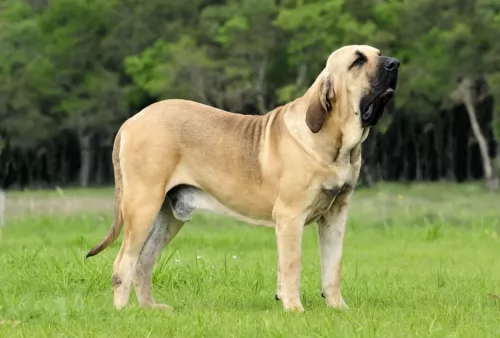 Hailing from Brazil, and known also as the Brazilian Mastiff, nobody seems to be too sure of the exact origins of the large Fila Brasileiro but it is believed to be a cross between the English Mastiff, the Bulldog and the Bloodhound.
Hailing from Brazil, and known also as the Brazilian Mastiff, nobody seems to be too sure of the exact origins of the large Fila Brasileiro but it is believed to be a cross between the English Mastiff, the Bulldog and the Bloodhound.
Other theories are that the dog comes from a mix of Portuguese and Spanish dogs and that they were bred to guard livestock from predators. Breeds that have no doubt contributed to the modern Fila are the Bullenbeisser, the Bloodhound, Mastiff and Rafeiro do Alentejo. All these dogs have characteristics such as excellent working dog skills, herding instincts as well as courage and tenacity.
The official Brazilian breed standard of the Fila was developed in the 1960s and the Fila Brasileiro Club of America was formed in 1984.
The Molossus has always been a popular dog and they have been around since ancient times. Mastiff type dogs are termed as Molossus.
Of course, when looking at the origin of the dog, there are many unsubstantiated claims about it. It has always been believed that the Molossus was a Mastiff-type dog, ferocious in battle. The Romans were dog breeders and recognized that the Molossus was a talented dog – good at guarding and herding.
Over the centuries the dog has changed but it is believed it was a Mastiff-type dog with a number of other breeds included in its origins such as the Rottweiler, Pug, Bulldog, Great Dane, Alano Espanol and Saint Bernard.
The Molossus isn’t a dog breed itself but rather a category that other dogs belong to. Today there are Molosser clubs and Molosser shows around the world.
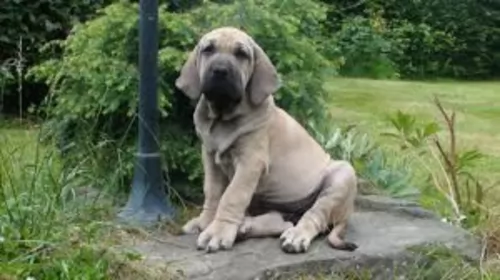 With his huge head covered in loose skin much like that of a Blooohound, and a body resembling that of a Mastiff, the large heavily built Fila Brasileiro is a mastiff breed from Brazil. He stands at 60 to 75cm in height and he weighs roughly 55 to 80kg.
With his huge head covered in loose skin much like that of a Blooohound, and a body resembling that of a Mastiff, the large heavily built Fila Brasileiro is a mastiff breed from Brazil. He stands at 60 to 75cm in height and he weighs roughly 55 to 80kg.
The ears of the Fila are large and droop down or are folded back, depending on his mood. The tail is long and slim. The coat of the dog is short and dense with the texture being quite smooth and soft. Colours of the coat can vary from solid fawn or black to red to brindle.
Perhaps the huge Fila wouldn’t be a good choice as a pet for the first-time inexperienced dog owner as he is a powerful, intelligent, self-assured, headstrong animal that will certainly need to have training and socialization if you want him as an obedient pet in your home.
He is a dog known for his courage and bravery. The Fila is loving and affectionate with his human family, being protective of them and not being too friendly with strangers. He isn't a particularly good pet choice with children in the home.
Some people, after buying a cute Fila puppy, put him out in the yard when he becomes large, and then they pretty much neglect him. This is cruel and irresponsible as he is a social, playful dog who wants to be part of his human family.
These dogs have some aggression in them and this makes them good watchdogs. They generally don’t show aggression towards their family but may snap at a stranger who tries to touch as he feels threatened.
This Ancient dog breed from Greece has different descriptions of what it really looked like. It seems to have always been large to medium sized dog standing in the region of 50 to 76cm in height and weighing anything from 25 to 55kg.
The coat is mostly short and smooth and can be in a host of different colors. They are large boned dogs, solidly built with medium sized floppy ears, a short, thick neck, short, broad muzzle and a long tail which was later docked.
Molossers typically have heavy bones, pendant ears, and a relatively short and well-muscled neck, with a short, broad muzzle. These Molossers have always been used for a variety of jobs where strength, perseverance, speed and braveness are required. They have been used as rescue- and guard dogs, protecting livestock from predators.
The Molossus dogs all have the same kind of characteristics which have been bred into them. From their working days, they are known for their tremendous courage, taking on wild animals to protect their livestock.
They are territorial, wanting to protect their human family and home from intruders.They have also been bred to be loyal, loving family pets, and being highly affectionate, they want to be involved in the activities of the family.
This breed is gentle and loving, social and active and gets on well with other pets in the home as well as with children. They’re intelligent dogs and will need to be trained and socialized to ensure they are obedient and amicable with visitors to the home.
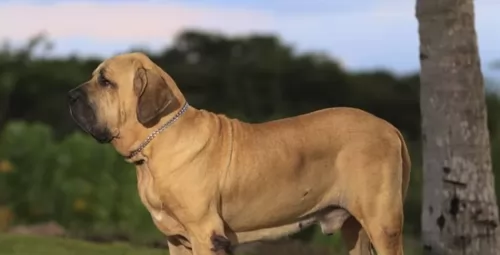 The Fila Brasileiro or Brazilian Mastiff is a powerful dog and it is believed that a large dog like this can be a danger to people if he isn’t trained and socialized.
The Fila Brasileiro or Brazilian Mastiff is a powerful dog and it is believed that a large dog like this can be a danger to people if he isn’t trained and socialized.
He is therefore not recommended for first time dog owners or homes with small children. He is a dog that is particularly wary of strangers too.
When he has been properly socialized he can be loving, loyal and obedient because it is essentially how a dog is brought up as to how he turns out.
If you bring one of these big, beautiful dogs into your home, have him socialized as a puppy, treat him firmly, but kindly and you could have yourself an extraordinary pet.
The Molossus, contrary to what many people think, isn’t a vicious dog, but rather a good natured dog that makes a wonderful family pet.
These dogs are known also for being hard working dogs with characteristics of bravery. They are dogs who may look fairly tough, but they are actually gentle, calm and sensitive. It’s a bad upbringing from the owners that gives any dog bad characteristics.
Train your Molossus, have him socialized and be a responsible and loving dog owner, and these dogs promise to make you a splendid family pet.
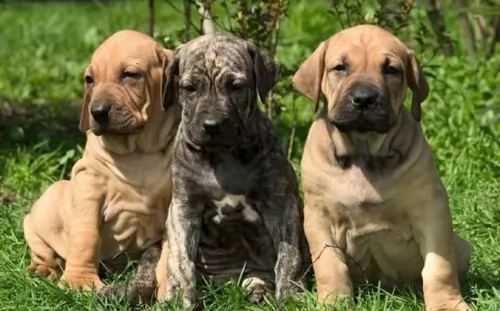 Filas are a dog breed who have a high rate of hip- and elbow dysplasia. This is a serious disease which can lead to lameness with your pet. Other orthopedic diseases with the breed include osteochondritis and luxating patella.
Filas are a dog breed who have a high rate of hip- and elbow dysplasia. This is a serious disease which can lead to lameness with your pet. Other orthopedic diseases with the breed include osteochondritis and luxating patella.
Also, as a deep-chested dog breed, your Fila also is at risk of getting the very serious gastrointestinal syndrome known as bloat. This is a common condition that can prove deadly for your pet. The Fila’s stomach will fill with gas, putting pressure on other organs and stopping blood flow to the heart and difficulty with breathing. Sometimes the stomach will twist. Get him to the vet immediately if you notice a swollen stomach, drooling or restless behaviour.
These large dogs are particularly prone to health issues such as hip dysplasia, a genetic condition. A poor diet as well as environmental factors can contribute towards the disease too as well as rapid weight gain and obesity.
This disease develops because the dog’s hip joints haven’t developed properly. The hips then partially dislocate, and the dog has pain and battles to get around. If your dog shows signs of hip dysplasia, he will need to get to the vet to do a physical exam and come up with a treatment- and management program.
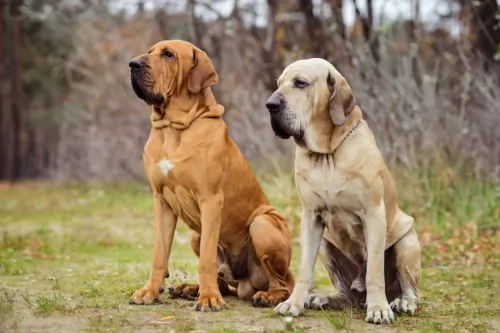 The Filas size makes it important that he have a good amount of exercise if you want to maintain his health and happiness. He isn’t a dog suited to city life as he is too large and will irritate his owners when cooped up in a tiny space with them. He isn’t demanding when it comes to exercise and activities all the time, but he should still be exercised regularly as he is inclined to become lazy .
The Filas size makes it important that he have a good amount of exercise if you want to maintain his health and happiness. He isn’t a dog suited to city life as he is too large and will irritate his owners when cooped up in a tiny space with them. He isn’t demanding when it comes to exercise and activities all the time, but he should still be exercised regularly as he is inclined to become lazy .
Moderate shedding. Regular brushing twice a week will be required. Check ears for infection and brush his teeth 2 or 3 times a week.
Nothing is set in stone as to what to feed your Fila Brasileiro, but a large dog will require quality food with a good amount of protein and fat according to size, age and activity levels.
Because a large breed dog is prone to hip dysplasia, look out for ingredients such as chondroitin and gludosamine which are specifically good for joint health. Try and avoid commercially manufactured food with common allergens such as soy, corn and wheat, artifical flavors and fillers.
A source of cooked rice, chicken and vegetables as well as some raw meat will be excellent for your big pet. Make sure he is never deprived of fresh, cool drinking water.
These dogs were bred to be working dogs and they have always spent their time outdoors performing a guarding or rescue role. Today they require a lot of exercise – walks and ball games – as they are dogs with a lot of energy.
Essentially a large breed, the Molossus will need a commercially manufactured food of high quality if you opt to make use of the convenience of these foods.
Make sure to choose one manufactured for large breeds and which is free of a host of bad ingredients such as corn, soy, wheat, dairy, artificial colors, sweeteners and preservatives.
You want dog food which is high in protein and fat. Try and include some home-cooked food such as boiled chicken, brown rice, pasta and vegetables. An ingredient to look out for in your dog’s food is omega-3 fatty acid to help keep the skin and coat shiny and healthy. Puppies particularly benefit from DHA, or Docosahexaenoic acid, a form of omega-3 fatty acid that is good for brain development.
Brushing the dog’s coat twice a week will be necessary to remove loose hairs, especially during the shedding period. When you brush him, check for ticks and fleas and speak to your vet about flea treatment if necessary. Ears and eyes should be checked and cleaned regularly.